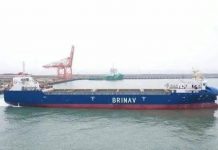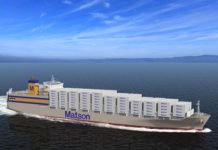
Two of the largest container port and terminal operators in the world, APM Terminals and DP World, announced an initiative to accelerate decarbonisation of the world’s terminals through the widespread electrification of container handling equipment (CHE).
The new initiative is grounded in research showing the tipping point for battery-electric CHE can be reached within the next 2-8 years with the right actions from industry stakeholders.
The research findings and roadmap for electrification of CHE are the subject of an industry White Paper, currently endorsed by Eurogate, Port of Kalundborg, and Smart Freight Centre.
CHE is a critical enabler of port operations and is used to move containers on and off ships across the world’s 940 container ports. In 2020, the global fleet of CHE enabled the transportation of 815 million TEUs, with a total value of US$8.1 trillion. Estimated at 100,000-120,000 units, the global CHE fleet is responsible for 10-15 million tonnes of carbon dioxide per annum (scope 1 and scope 2).
Research has found that the challenges hampering the uptake of battery-electric CHE can be mostly overcome. An inflection point for battery-electric CHE to replace diesel CHE as the more affordable, attractive and accessible option can occur in the next 2-8 years, provided that industry stakeholders take action now. The White Paper identifies key levers and related actions that can be taken by the players across the value chain including terminal operators, OEM’s, port authorities, affiliated government entities and shipping line operators.
“Let me be clear: we need to accelerate our work in decarbonisation, and we need to do it now. I am happy to say the research we conducted through Systemiq and ZEnMo strongly backs that a tipping point for the electrification for [CHE] is within reach in this decade. We are now calling for action for the entire port ecosystem to accelerate towards this milestone. It is important for us to stand together, take concrete action with several industry partners for this to happen,” pointed out Keith Svendsen, CEO of APM Terminals.
Tiemen Meester, COO of Ports & Terminals at DP World, commented, “Battery-electric equipment in ports is a realistic, achievable and affordable way to dramatically reduce carbon emissions. Throughout my career I’ve seen many industry players talk about various methods for achieving net-zero, but I’ve never been so convinced by one tactic’s ability to accelerate decarbonisation. It is my sincere hope that the findings in the White Paper can be used by the entire industry to galvanise real change with electric CHEs.”
The research mentioned provides for a number of actions that can be taken to reach a tipping point, including making zero-emission operation a requirement as part of new concessions in ports, and terminal operators and equipment manufacturers working together to scale up demand. Furthermore, suppliers can work on further developing their supply chains and standardising certain components, with the support of terminal operators.
“Essentially, what we want is to provide a healthier, cleaner, and more efficient workplace for the thousands working at the terminals and living in the communities around them. And while electrification of of the container handling equipment is one piece of the puzzle, we believe it is one piece that can be addressed relatively easier and faster than others if we work together and avoid unnecessary complexity,” said Sahar Rashidbeigi, Global Head of Decarbonisation at APM Terminals.





